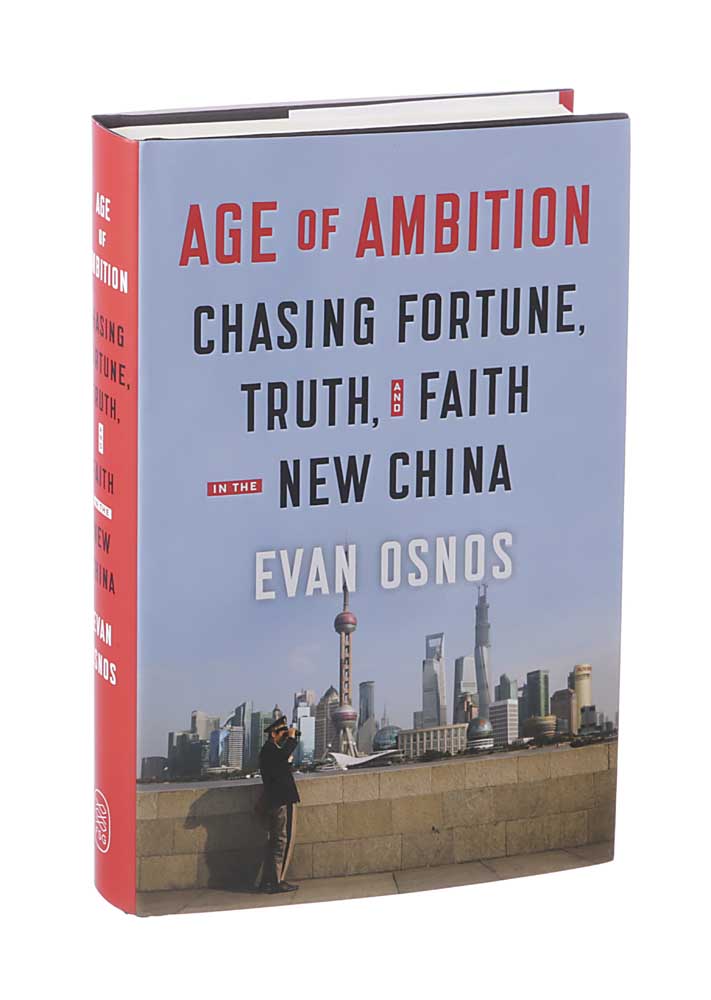Two new books gauge China’s social upheaval
Published 12:00 am Sunday, June 1, 2014

- Sonny Figueroa / New York Times News Service"Age of Ambition" by Evan Osnos
“Age of Ambition: Chasing Fortune, Truth, and Faith in the New China” by Evan Osnos (Farrar, Straus and Giroux, 403 pgs., $27)
“Leftover Women: The Resurgence of Gender Inequality in China” by Leta Hong Fincher (Zed Books, 213 pgs., $24.95)
Evan Osnos appears to be almost as entrepreneurial, intrepid and creative as the strivers whose linked portraits underpin his book “Age of Ambition: Chasing Fortune, Truth, and Faith in the New China.” During eight years of remarkable reporting from China, much of it for The New Yorker, Osnos ferreted out interesting people to interview, from the billionaire “Queen of Trash” Cheung Yan to a poet sweeping the street outside Osnos’ home in Beijing. His network included the popular blogger Han Han, whose website has had more than a quarter of a billion visitors, and the dissident and Nobel Peace Prize winner Liu Xiaobo. Others were unknowns, like Michael, who hopes to make his fortune by writing English textbooks; his dreams and self-doubt capture China’s historical moment.
“Age of Ambition” is, Osnos writes, “an account of the collision of two forces: aspiration and authoritarianism.” It is also a riveting and troubling portrait of a people in a state of extreme anxiety about their identity, values and future. Osnos paints a China rived by moral crisis and explosive frustration, whose citizens are desperate to achieve wealth, even as they are terrified of being left with nothing. The Communist Party leadership, Osnos writes, is so morally and intellectually bankrupt that only the uneasy bargain to provide “prosperity in exchange for loyalty” allows it to retain a semblance of legitimacy. Even so, “the gap between the society’s meritocratic myth and its oligarchic reality was becoming clear and measurable.”
This book focuses on the quest for wealth (“fortune”), the suppression of dissent (“truth”) and spiritual seeking in the face of moral crisis (“faith”). To illuminate these themes, Osnos is up for almost anything. He joins a Chinese tour group and experiences Europe through the eyes of his companions, noting their “fierce curiosity about the world and a defensive pride in China’s new place in it.” He travels to the gambling mecca of Macau to document money laundering and the spoils of government corruption.
An eclectic cast
His eclectic portraits are drawn from across the political spectrum: He befriends a nationalistic, neoconservative videographer who turns out to be a philosophy student in Shanghai. He travels to Shandong to try to interview the cantankerous blind lawyer Chen Guangcheng, a defender of women resisting the one-child policy, whom he finally meets after Chen escapes house arrest and finds his way to New York. He hangs out with the fabulously wealthy Gong Haiyan, who made her fortune with a dating website.
Some of these characters appear several times, giving the book a cumulative effect that helps persuade the reader that China has lost its way. The remarkable story of Lin Yifu, the Taiwanese defector who swam across the strait to become the World Bank’s chief economist and later a cheerleader for China’s economic prosperity, provides a strong narrative thread. So, too, does the story of the persecuted artist Ai Weiwei, who tried to push the limits of the possible by turning his own life into artwork and was then beaten, jailed and accused of tax evasion when authorities sought to muzzle him.
People seem willing to grasp at almost anything for a chance to succeed. Li Yang, the inventor of a shouted language-learning technique called Crazy English, has rock-star status, so central has English become to “the promise of self-transformation.”
Osnos has a keen grasp of how the Internet has transformed China’s political landscape, circumventing the government’s efforts to manage information about public incidents. He pursues the story of the Shenzhen toddler Little Yueyue, whose death — she was hit by a van and a truck and then ignored by passers-by — caused a national soul searching on the Chinese blogosphere. (An elderly, illiterate scrap-metal recycler finally stopped to help Yueyue, but too late.) He tells the story of the 2011 Wenzhou high-speed rail crash, news of which the government tried to censor and which eventually revealed astonishing levels of corruption, kickbacks and illegal subcontracting among railway officials, becoming an “iconic failure of government performance.”
Many of the people who figure prominently in “Age of Ambition” are well-known in the West but little-known in China. In a moment of introspection, Osnos writes that he struggled with how much to write about these dissenters. “How much did their ordeals really tell us about China?” he asks. “How much was about opportunity and how much was about repression? From far away it was difficult for outsiders to judge, but I found that up close it wasn’t much easier, because it depended on where you were looking.” The vast efforts and expenditures that the government committed to try to keep these people unknown, Osnos concludes, are in themselves compelling evidence of their importance.
‘Leftover Women’
Leta Hong Fincher’s “Leftover Women” offers a very different, if equally chilling, account of the pressures on Chinese strivers. She is particularly interested in young urban Chinese who seek to cement their arrival in the middle class through the purchase of an apartment. A sociology Ph.D. student at Tsinghua University, Fincher studied residential property transactions, which alerted her to structural economic discrimination against women in the post-socialist era.
Fincher argues that women are pressed to accept unsuitable marriages while in their mid-20s. The state, alarmed by gender imbalances and the potential for unattached men to create social unrest, has allied with insecure parents to describe them as “leftover” if they delay, she says. The women are systematically deprived of homeownership because of parental and spousal pressure to put real estate in the husband’s name, even if the woman, or her parents, has contributed significantly to the purchase.
A third of Chinese marriages now end in divorce; a recent Supreme Court decision awards property according to the name on the deed. Chinese women are thus in severely disadvantaged financial positions both during marriage, making them vulnerable to abuse, and after its dissolution. One hopes that “Leftover Women” will soon be translated into Chinese, as it is likely to resonate deeply with urban educated women. It seems the party has forgotten the Mao-era dictum: “Women Hold Up Half the Sky.”






